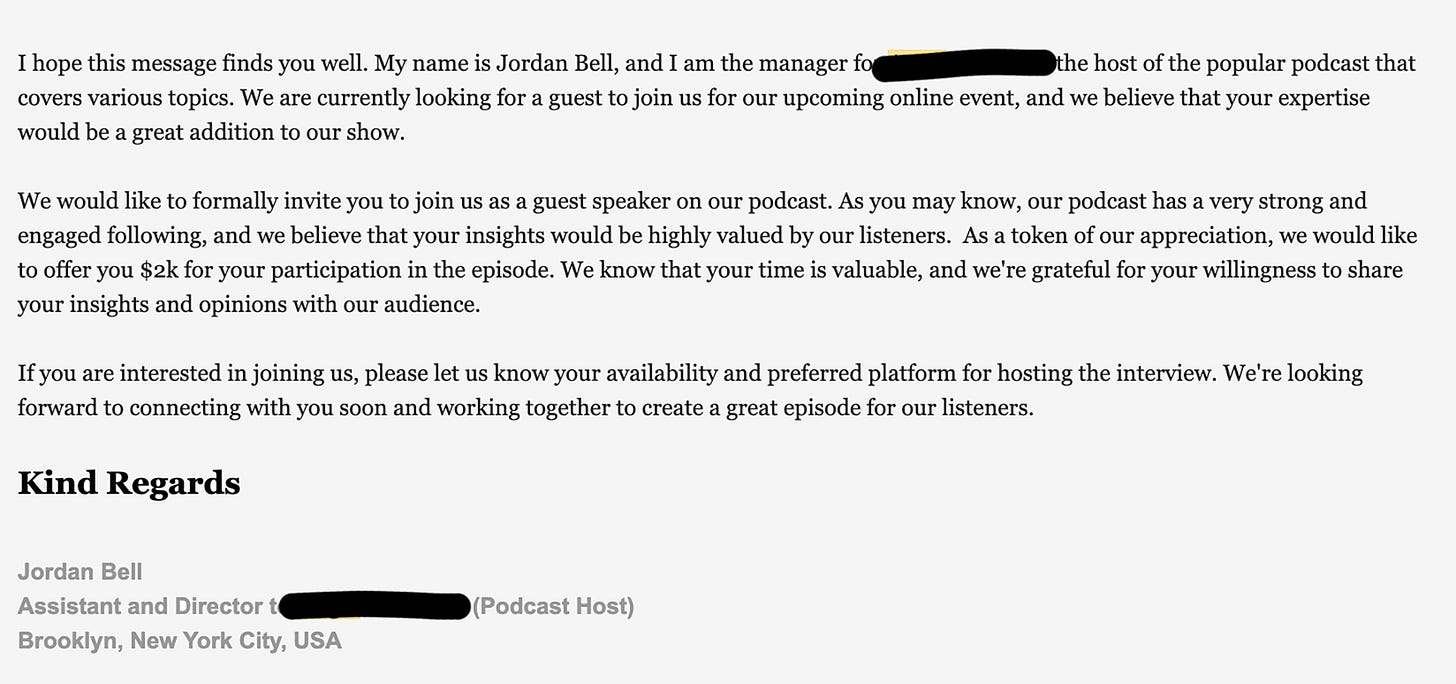Welcome to In the Flash, a weekly, behind-the-lens dialogue on photography. To join the conversation
A few weeks ago I got an email inviting me to a podcast and offering me 2K for the episode. I’ve been on several podcasts in the past; none had a fee attached, so that should have been red flag #1. But the email address looked legit, there were no misspellings or strange turns of phrases, and the podcast checked out. The show host was famous enough to be able to offer a monetary incentive to the person for their time. Of course, that was my greedy goblin voice speaking. In retrospect, an offer of 2K per episode is ridiculous.
The person emailing me introduced himself as podcast host’s manager, Jordan Bell. When googled his name, I couldn’t find any info. Red flag #2. I continued searching for scams, putting in different keywords like “podcast invitation scam,” but nothing came up. My greedy goblin rejoiced.
I wrote Jordan back, and we set a date. A few polite emails were exchanged; nothing seemed alarming. Last morning, Jordan checked in about the podcast date scheduled for next Monday. I forgot that I had to fly out to an assignment and asked if we could possibly switch it for another day. He instantly said yes, offering me a spot as soon as tomorrow. I made a few more requests; all were accepted right away. Red flag #3. Jordan was way too accommodating for someone who was going to pay me $2K for an hour of my time. By this point, I suspected this was a scam, but I was curious to see how it plays out.
After we picked a final date, Jordan asked me to jump on a quick tech call. The podcast was going to be streamed live on Meta, and he wanted to make sure I was able to do that. I have 73K followers on my professional Meta account, and it wasn’t the first time I got asked to do an event there, so that wasn’t too surprising in itself. Tech calls are also common. I checked the Zoom link; it was legit, and it opened straight in the app. But the person on the other end didn’t turn their video on and spoke in a heavy foreign accent. Red flag #4. By this point, I knew this was, indeed, a scam.
I decided to play along and satisfy my curiosity. Sure enough, “Jordan” directed me to my Meta Business Suite → Settings → People → Users and began a convoluted explanation why I need to add my own email to make Facebook live work. I’ve heard enough and hung up.
Going back to Google, I put in more precise keywords, “Meta live streaming scam,” and after pages and pages of nothing, I came upon a video of a woman detailing an almost exact same scam that she unfortunately fell prey to. After following the same steps I was given, she was asked to share her screen to help with the instructions and eventually put in her own email into the Users permissions page. The scammers copied the admin link for permissions and clicked on that link first, adding themselves as admins, then locked her out of her page.
Digging deep into Reddit, I found more examples of the scam, targeting people with a blue check mark/some kind of following, offering a podcast spot with a monetary incentive, then taking over their socials. This form of social engineering hacking scam — making someone give up their information — is a pretty sophisticated operation to steal someone’s Meta page.
When I read about scams on the internet, I always imagine that I would never fall prey to such a racket. This was the closest I came, and until the “tech check” Zoom call, I let myself believe that this was the real deal. These scammers are appealing to a person’s ego and optimism, a dangerous combination for clouding your judgment.
There was another podcast invitation in my inbox this morning, this time legitimate. The host asked to discuss photography and my newsletter and didn’t offer me any money for the appearance, reminding me of the simple truth that if the offer is too good to be true, it always is.
I wrote about my experience, so there is information out there that the next person can google when they search for similar scams. The lack of information about it is what almost got me, and the only weapon against these fraudulent operations is awareness. If you are reading this, please share and spread the word.
Find me on Instagram @dina_litovsky







Thanks for this, and it is extremely timely. I had a call from my employer yesterday asking for the FB password, and was trying to log onto a Facebook call with someone who wanted to do an interview. I read this and called him this morning - they had offered $2000 for the interview and done enough research to know who he would be interested in being interviewed by.
The zoom caller asked him to have an administrator at today's call, so clearly they hit our two-factor authentication and wanted past it as well.
Talk about reading your story in the nick of time! Thanks, Dina!
I recently published a photo book that has sold pretty well. A few months later I got an email supposedly from a major well known Movie/TV production company asking me to sell them the rights for a streaming series. It included a Zoom schedule of open times to meet with the producer. Google searched the company (many big TV and movie projects) and his name all came back as a real person/company.
I kept on scheduling times and nobody ever showed up at the meeting. Email address was just a little different that the listed company domain. No emails were ever returned.
Finally gave up and found that the entire thing was bogus. They never asked me for any money, so I have no clue what their end-game was, other than piss folks off and raise their expectations.
However, based on the concept I got from the scammer, I am now negotiating with a few real folks to turn the book into a streaming series.